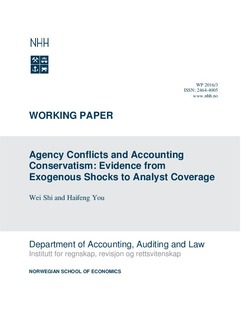| dc.description.abstract | We examine how companies voluntarily change their financial reporting conservatism in response
to an exogenous decrease in analyst coverage. We hypothesize that more severe information
asymmetry and weaker external monitoring associated with such a decrease in analyst coverage
exacerbate agency conflicts between contracting parties, which in turn creates a greater demand
for conservative accounting. Consistent with this prediction, we document a significant increase
in accounting conservatism following an exogenous drop in analyst coverage. Furthermore, the
effect is stronger when the dropped analyst is more informed and when the affected firm has a
higher financial leverage ratio, less favorable credit ratings, and a higher proportion of cash-based
CEO compensation. The overall evidence is consistent with the notion that accounting
conservatism arises as part of the efficient technology employed by firms to address agency
problems between contracting parties. | nb_NO |
